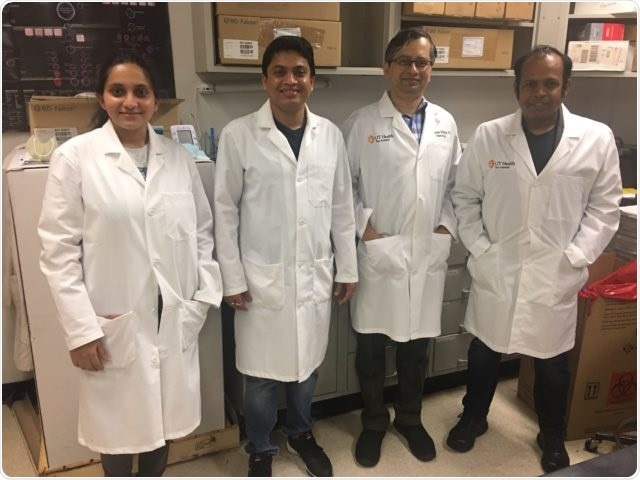Researchers in Pennsylvania and Texas have discovered a novel protein sensor that limits the amounts of fat and sugar that are converted into energy by human cells, during the starvation periods.

The Muniswamy laboratory includes, from left, Soundarya Kandala; Soumya Maity, PhD; Subramanya Srikantan, PhD; and Madesh Muniswamy, PhD. Image Credit: University of Texas Health Science Center at San Antonio.
According to the researchers, the sensor could potentially be improved further to stimulate the conversion of more sugar and fat in people suffering from metabolic conditions like cardiovascular disease, obesity, and diabetes and who require assistance in reducing their weight and adopting a healthier lifestyle.
The research was published in the Science Signaling journal, on April 21st, 2020.
Madesh Muniswamy, Ph.D., a senior author of the study, from the Long School of Medicine at The University of Texas Health Science Center at San Antonio, is a professional in the properties and function of mitochondria, which are essentially the cell structures that change fat and sugar into chemical energy known as ATP.
We want to offer, in the future, a solution to the metabolic crisis faced by millions of people across the world. Millions of people consume too much food, while millions of others are in poverty and subsist on too little food. We are studying what happens at the molecular level in both situations with a goal of developing a drug to intervene.”
Dr Madesh Muniswamy, Study Senior Author, Long School of Medicine, University of Texas Health Science Center at San Antonio
Speed of conversion
Similar to cars and roadways, human bodies constantly move things from one cell to another. The mitochondrial calcium uniporter, or MCU for short, is the medium needed for converting fat and sugar.
The pace at which the MCU moves the energy is important, just like how traffic moves people to their destinations. If this energy movement becomes too slow, it leads to conditions like obesity, and if it is too fast, it leads to malnourishment.
Dr. Muniswamy stated that it is always desirable to drive a regulated speed limit for proper health.
Keeper of the road
In the study published in the Science Signaling journal, Dr. Muniswamy and his collaborators explained another important component that, similar to a traffic police officer, controls this roadway activity.
We identified a mitochondrial protein called MICU1 that functions as a gatekeeper of this roadway.”
Dr Madesh Muniswamy, Study Senior Author, Long School of Medicine, University of Texas Health Science Center at San Antonio
When there is a drop in the nutrient levels, the MICU1 blocks the channel activity to prevent the surplus transaction of energy. Dr. Muniswamy added, “When you’re starving, you want to live longer, you don’t want to burn all the sugar and the fat you have, so MICU1 slows down the activity.”
The reverse is also true—MICU1 can speed it up if the roadway traffic is driving too gradually.
Relieve conditions
In the future, we might design a new drug to control this pathway to basically alleviate many cardiovascular- and metabolic syndrome-related diseases. That’s our plan. When you speed up the channel, all the sugar and fat will be burned, and you slim down.”
Dr Madesh Muniswamy, Study Senior Author, Long School of Medicine, University of Texas Health Science Center at San Antonio
Source:
Journal reference:
Neeharika, N., et al. (2020) Mitochondrial pyruvate and fatty acid flux modulate MICU1-dependent control of MCU activity. Science Signaling. doi.org/10.1126/scisignal.aaz6206.